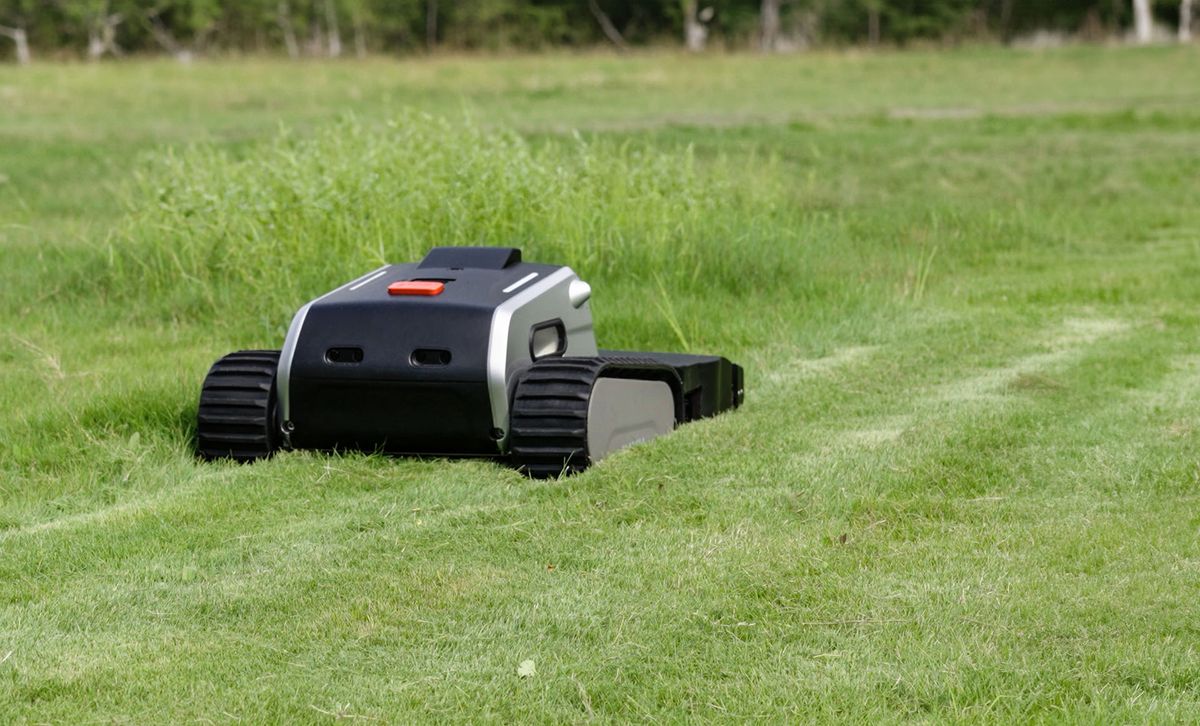The Lymow One is a robotic lawn mower that’s designed specifically for tackling large, complex lawns. In fact, its makers promise this rugged lawn bot has “unparalleled terrain adaptability” and can cover five times as much lawn as competitor models (specifically, 0.23 acres per hour, or up to 1.73 acres each day).
Most lawnbots have wheels, but this guy comes with tracks like a tank, for improved speed and stability. It can clear obstacles up to two inches in height and traverse inclines of up to 45 degrees, even if said incline is wet and slippery.
This bot is currently showing at CES 2025, following a successful Kickstarter campaign from a relatively new brand. It has piqued my interest specifically because founder and CEO Wangshu Gao used to run the R&D department at SharkNinja and also previously co-founded Narwal. That means he has experience with some of the best robot vacuums around, and while it’s not exactly the same thing, it seems he’s brought plenty of expertise from that related market into creating the Lymow One.
(Image credit: Lymow)
For starters, special attention has been paid to navigation; like many newer lawnbots, it doesn’t require boundary wires. There are a few ways robot lawn mowers can navigate, but Lymow’s approach combines satellite positioning with vSLAM technology. The latter is designed to take over when trees, roofs or walls block the satellite view, and is one of the navigation methods used by robot vacuums. You can edit the bot’s maps to great mowing zones and no-go areas.
Another feature more common to robot vacuums is intelligent object avoidance; here powered by a combination of image-based semantic recognition and depth-sensing. Essentially, it’s designed to identify obstacles and use that information to react appropriately. So if it senses a nearby obstacle like a sprinkler or a hedgehog, it will give it a wide berth, but if it comes across a decomposing apple or pine cone, it’ll be able to mulch it up for you (you use the app to set what you want it to do with natural debris like this).
The mower has an effective cutting width of 16 inches / 40.6cm – making it an efficient way to cover large spaces – as well as an adjustable cutting height range of 1.2 to 4 inches. The floating mowing deck follows the wheels, to ensure the lawn ends up even when the ground is not.
Cutting-edge tech
Rather than traditional lateral scissor blades the Lymow One has two mulching blades; the kind of which you’d find in a regular manual mower. These spin at 6,000RPM to handle any type of grass – wet, dry, dense – as well as pulverizing things like fallen fruit or small branches (if you’ve asked it to).
Those blades are paired with a powerful fan that blasts the fine cuttings out evenly and at high speed (if you’re unfamiliar, this is basically how most robot lawn mowers work, to avoid the issue of leaving you with piles of grass cuttings to empty).
(Image credit: Lymow)
“Most robotic mowers today are built for small yards, but many US homes have large, complex lawns. As a result, these mowers often serve as a supplement rather than a true replacement for traditional mowers,” says CEO Wangshu Gao. “With Lymow One, we’re taking a different approach. Our product is designed to fully replace traditional mowers, delivering superior automated lawn care.”
The Lymow One is slated for delivery in April 2025, priced at $2,999.
We’re covering all of the latest CES news from the show as it happens. Stick with us for the big stories on everything from 8K TVs and foldable displays to new phones, laptops, smart home gadgets, and the latest in AI.
And don’t forget to follow us on TikTok for the latest from the CES show floor!
You might also like…
The post This robot lawn mower promises to traverse awkward lawns with the agility of a mountain goat appeared first on World Online.

